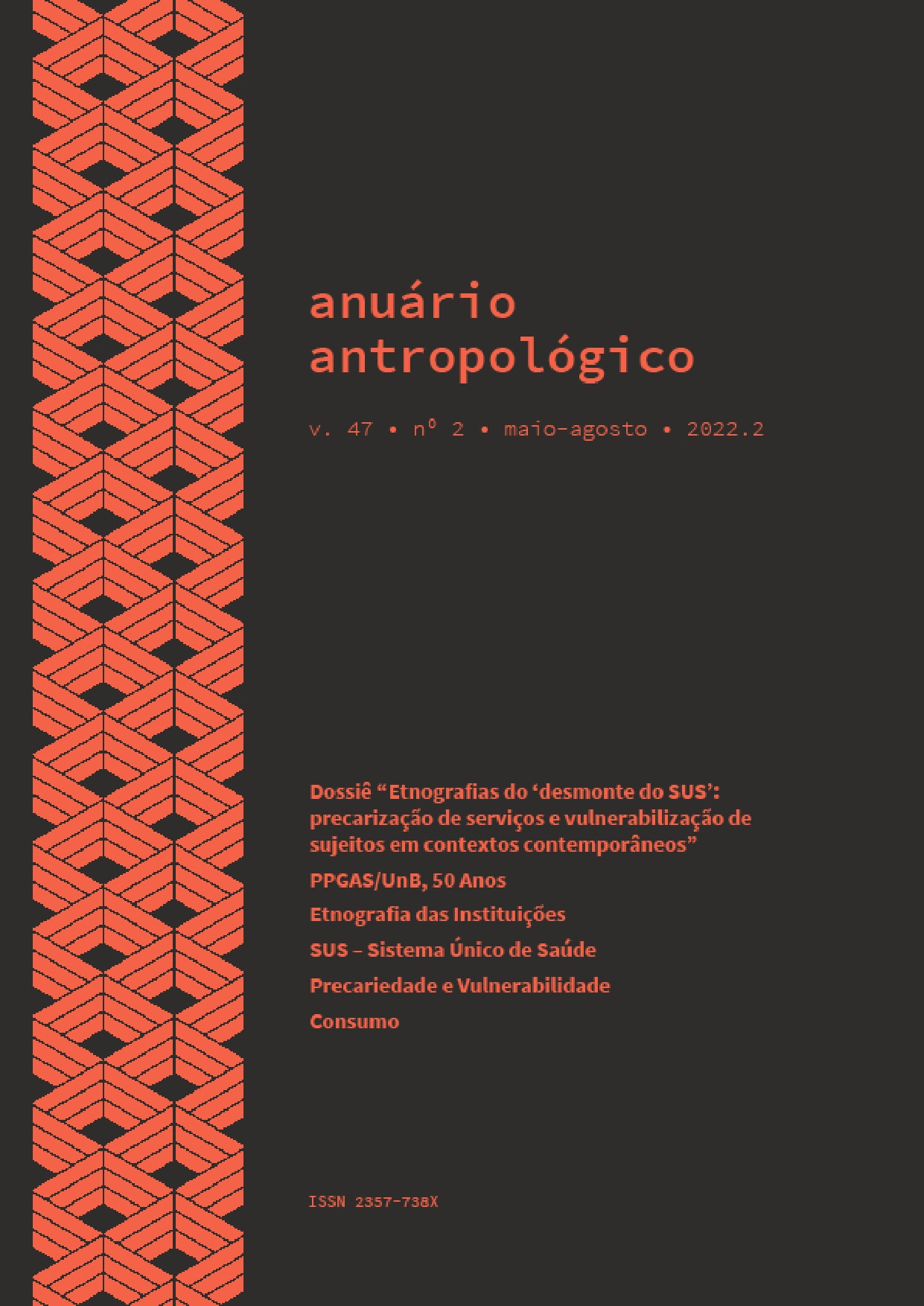Doubly lethal: the psychological havoc of health care workers during the covid-19 pandemic
DOI:
https://doi.org/10.4000/aa.9699Keywords:
precarization, sus, caps ad, pandemicAbstract
In this article, I seek to expose and develop how the precariousness of the Unified Health System (SUS) affects the processes of subjectivation of those bodies that compose it. Using data collected from an ethnographic incursion in a Center for Psychosocial Care Alcohol and Drugs (CAPS AD), in a city in the interior of São Paulo, the text that follows is organized by an elaboration of the impacts that major epidemiological events have on the mental health of the populations they affect, particularly in the case of health professionals who conduct their professional practices under these contexts. Furthermore, I aim to work on the particularity of the pandemic of covid-19 from an examination of the political contingencies that make the Brazilian case unique within the global context of the pandemic. In a second moment, I connect macro-structural political processes to everyday micro-politics of care and the affections they engage. To demonstrate these ways in which major changes affect individual trajectories, I use the theoretical basis developed by the field of the anthropology of emotions. To support the argument, I used interviews and ethnographic narratives that were part of my field material during the course of my master’s degree which took place entirely during the covid-19 pandemic.
Downloads
References
Carvalho, Heráclito Barbosa de, e Sergio Dario Seibel. 2009. “Crack cocaine use and its relationship with violence and HIV”. Clinics 64: 857–866.
Castro, Rosana, Cíntia Engel, e Raysa Martins. 2018. Antropologias, saúde e contextos de crise. Brasília: Sobrescrita.
Coelho, Maria Claudia Pereira, e Susana Soares Branco Durão. 2017. “Introdução ou como fazer coisas com emoções”. Interseções: Revista de Estudos Interdisciplinares 19(1): 44–60.
COFEN – Conselho Federal de Enfermagem. 2021. “Brasil perde ao menos um profissional de saúde a cada 19 horas para a Covid”. http://www.cofen.gov.br/brasil-perde-ao-menos-um-profissional-de-saude-a-cada-19-horas-para-a-covid_85778.html
Cruz, Vania Dias et al. 2013. “Consumo de crack e a tuberculose: uma revisão integrativa”. SMAD – Revista Electrónica em Salud Mental, Alcohol y Drogas 9(1): 48–55.
Csordas, Thomas. 2008. “A corporeidade como paradigma da Antropologia”. In Corpo/significado/cura (v. 5). Porto Alegre: Editora da UFRGS.
Das, Veena. 2015. Affliction: health, disease, poverty. New York: Fordham University Press.
Das, Veena, e Ranendra K. Das. 2006. “Pharmaceuticals in urban ecologies”. In Global pharmaceuticals, org. Adriana Petryna, Andrew Lakoff, e Arthur Kleinman, 171–205. Durham: Duke University Press.
Faria, Paula de Fátima Oliveira, Sabrina Helena Ferigato, e Isabela Aparecida de Oliveira Lussi. 2020. “O apoio matricial na rede de atenção às pessoas com necessidades decorrentes do uso de álcool e outras drogas”. Cadernos Brasileiros de Terapia Ocupacional 28: 931–49.
Foucault, Michel. 2012. História da sexualidade I: a vontade de saber. Traduzido por Maria Thereza da Costa Albuquerque. São Paulo: Graal.
Han, Byung-Chul. 2021. “Teletrabalho, zoom e depressão: o filósofo Byung-Chul Han diz que exploramos a nós mesmos mais do que nunca”. El País, Brasil, 22 mar. 2021. Cultura, Ideias. https://brasil.elpais.com/cultura/2021-03-23/teletrabalho-zoom-e-depressao-o-filosofo-byung-chul-han-diz-que-nos-exploramos-mais-que-nunca.html?eventlog=oklogin
Kuper, Hannah et al. 2019. “The association of depression, anxiety, and stress with caring for a child with Congenital Zika Syndrome in Brazil; Results of a cross-sectional study”. PLoSneglected tropical diseases 13(9): e0007768.
Lancetti, Antonio. 2015. Contrafissura e plasticidade psíquica. São Paulo: Hucitec.
Latour, Bruno. 2020. Imaginar gestos que barrem o retorno da produção pré-crise. Traduzido por Débora Danowski e Eduardo Viveiros de Castro. https://n-1edicoes.org/008-1
Lutz, Catherine A. 2011. Unnatural emotions. Chicago: University of Chicago Press.
Lutz, Catherine A., e Lila Abu-Lughod. 1990. « Language and the politics of emotion”. In This book grew out of a session at the 1987 annual meeting of the American Anthropological Association called "Emotion and Discourse". Editions de la Maison des Sciences de l'Homme.
Lotta, Gabriela et al. 2021. Nota Técnica à Pandemia de Covid-19 e os(as) Profissionais de saúde Pública no Brasil – 4ª Fase. Rio de Janeiro: FGV/EASP/Fiocruz. https://portal. fiocruz.br/sites/portal.fiocruz.br/files/documentos/a-pandemia-de-covid-19-e-os-profissionais-de-saude-publica-no-brasil_fase-4.pdf
Machado, Maria Helena, coord. 2017. Perfil da enfermagem no Brasil: relatório final –Brasil. Rio de Janeiro: NERHUS/DAPS/ENSP/Fiocruz.
Martins, Tatiana, Janaína Luz Narciso-Schiavon, e Leonardo De Lucca Schiavon. 2011. “Epidemiologia da infecção pelo vírus da hepatite C”. Revista da Associação Médica Brasileira 57(1): 107–12.
Minayo, Maria Cecília de Souza, e Neylson Freire. 2020. “Pandemia exacerba desigualdades na Saúde”. Ciência & Saúde Coletiva 25(9): 3555–6.
Parker, Richard. 2003. “Construindo os alicerces para a resposta ao HIV/AIDS no Brasil: o desenvolvimento de políticas sobre o HIV/AIDS, 1982–1996”. Divulgação em Saúde para Debate 1(27): 8–49.
Preciado, Paul B. 2020. “Aprendiendo del vírus”. El país. https://elpais.com/elpais/2020/03/ 27/opinion/1585316952_026489.html
Povinelli, Elizabeth A. 2011. Economies of abandonment. Durham: Duke University Press.
Rezende, Claudia Barcellos, e Maria Cláudia Coelho. 2010. Antropologia das emoções (Série Sociedade e Cultura). Rio de Janeiro: Editora Fundação Getúlio Vargas.
Rui, Taniele Cristina. 2012. Corpos abjetos: etnografia em cenários de uso e comércio de crack. Tese de doutorado, Universidade Estadual de Campinas, Campinas.
Rutstein, David D. et al. 1976. “Measuring the quality of medical care: a clinical method”. New England Journal of Medicine 294(11): 582–8.
Stengers, Isabelle, e Philippe Pignarre. 2011. Capitalist sorcery: breaking the spell. New York: Palgrave.
Xiang, Yu-Tao et al. 2020. “Timely mental health care for the 2019 novel coronavirus outbreak is urgently needed”. The lancet psychiatry 7(3): 228–9.
Downloads
Published
How to Cite
Issue
Section
License
Copyright (c) 2023 Anuário Antropológico

This work is licensed under a Creative Commons Attribution-NonCommercial-NoDerivatives 4.0 International License.
https://creativecommons.org/licenses/by/4.0/legalcode.en
Creative Commons - Atribución- 4.0 Internacional - CC BY 4.0
https://creativecommons.org/licenses/by/4.0/legalcode.en



